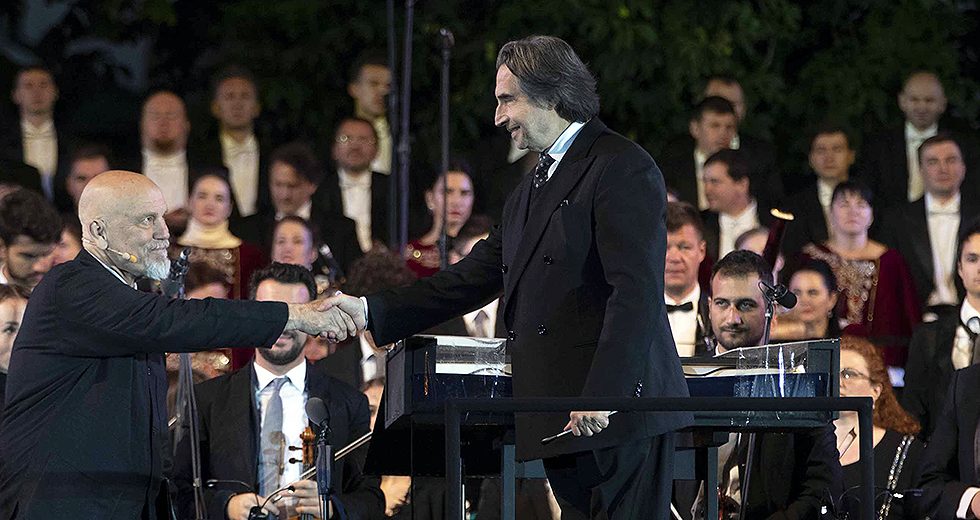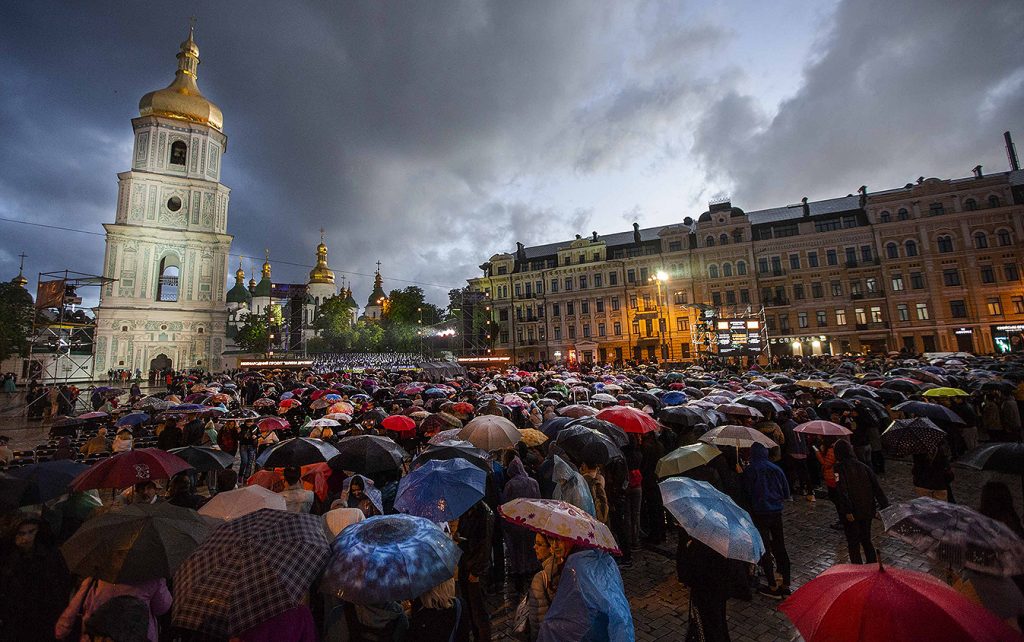
Neither rain nor cold could keep Riccardo Muti and his combined musical forces from the 22nd annual Roads of Friendship concerts last week. This year’s edition of the goodwill mission, a project of Italy’s Ravenna Festival, occurred in Kiev, Ukraine, with the first concert on July 1, followed by a repeat on July 3 in Ravenna. Established in 1997 with the goal of building bonds among nations afflicted by war, natural disasters or political conflict, the Roads of Friendship promotes the power of music to lift the human spirit. “It’s a universal message,” said Muti, music director of the Chicago Symphony Orchestra. “Music performs miracles that often those who govern can not do.”
Though past editions have been presented in political flashpoints such as Sarajevo, Beirut, Istanbul, Damascus and Tehran, the Roads of Friendship concerts take a purely non-partisan stance. “Our presence is not meant to be on one side politically or the other,” Muti has said. “We bring a message of hope and a desire for reconciliation and brotherhood.”
Despite a steady downpour, inclement temperatures and an hourlong rain delay, a crowd of 10,000 turned out for the July 1 outdoor concert at Kiev’s St. Sophia Square. “The sky has begun to cry over Kiev to remind us that we are small in the face of the great events where we believe we are the masters,” said Cristina Mazzavillani Muti, founder and president of the Ravenna Festival, to the crowd. “A great silence fell on a crowd that for months had been waiting for this meeting, through music, between Italy and Ukraine.“

At Kiev’s St. Sophia Square, concertgoers brave the rain to hear the Roads to Friendship performance led by Riccardo Muti. | Photo: ©Silvia Lelli
The Ravenna team selected Kiev, Ukraine’s capital, on the suggestion of Culture Minister Yevhen Nyshchuk. Joining Muti were the orchestra and chorus of the National Opera Theater of Ukraine, Muti’s own Luigi Cherubini Youth Orchestra, Kiev’s Credo Chamber Choir and students from the Tchaikovsky National Music Academy and the Mariupol Music Institute. The program consisted of works by Verdi and Copland’s Lincoln Portrait, narrated by American actor John Malkovich (who performed the same work with Zell Music Director Riccardo Muti and the CSO in April).
Before the concert, Ukrainian President Petro Poroshenko bestowed state awards upon the Mutis and Malkovich. In previously published remarks, Poroshenko touched on the concert’s significance to his country, under attack by neighboring Russia: “This is an incredible music festival that brings together Ukraine and Europe and returns Ukraine to the European family of nations. It is particularly important that this concert takes place at a time when Ukraine is fighting back against the military aggression of the Russian Federation. We have support all over Europe and all over the world finally to [find] peace in our land.”
In an interview with the Spanish national newspaper El País, Muti discussed how the concert’s music selections advanced a greater cause. “Without a doubt, the chorus ‘Va, pensiero’ of [Verdi’s Nabucco] acquires a current meaning today, because it demands love, peace and brotherhood,” he said. “But also the words of Abraham Lincoln, which Copland uses [in Lincoln Portrait], where he states that there should be no slaves for the same reason that there should be no tyrants.”
Muti selected Lincoln Portrait for these concerts in part because the Ravenna Festival this summer is saluting American civil rights leader the Rev. Martin Luther King on the 50th anniversary of his death. “In times or places in which democracy is under attack, its message can resonate,” wrote George Loomis of the Kiev concert in Musical America. “With actor John Malkovich articulating Lincoln’s words, it certainly did so here.”
The Italian daily newspaper Corriere della Sera declared that “Muti triumphs in Kiev with the music of miracles,” and its correspondent Valerio Cappelli summed up the Ukrainian concert as “one evening in Kiev, with Verdi and his very human song of sorrow, and Lincoln and his sense of community and democracy. [Here are] people who do something for other people.”
Throughout the Kiev performance, the sense of many nations coming together as one hung in the air. “The Verdi Stabat Mater assumes this time, by virtue of Ukrainian choirs, a burnished color, darker than usual, a new sound as perhaps it can only come from the union of two different cultures,” wrote Benedetta Saglietti for the Italian site Alfabeta 2.
Writing in Il Sole 24 Ore, Carla Moreni observed, “What music teaches is its need to be realized, to be alive. Even in the most extreme conditions, it must be done. … In the end, the final [result] is beautiful precisely because it won a battle. Symbolic. Exemplary. Certainly less difficult than peace, however.”
Two days later, the program was repeated in the Palazzo Mauro de André, a Ravenna sports facility seating 4,000. “Perhaps it was because hostile weather was no longer a detriment, and clearly the acoustic was better, but the concert came off especially well,” Loomis wrote.”Muti reached a real rapport with his performing forces. The chorus, slimmed down by about half, consisted only of the singers from the National Opera and sounded great. And when ‘Va, pensiero’ was sung a final time, it touched the heart.”
TOP: Riccardo Muti shakes hands with narrator John Malkovich after a performance of Copland’s Lincoln Portrait in Kiev. | Photo: ©Silvia Lelli